九年级英语课堂笔记
九年级上册英语课文笔记

九年级上册英语课文笔记Section A.1. 单词部分。
- textbook (n.) 课本;教科书。
例句:We need to bring our textbooks to class.- conversation (n.) 交谈;谈话。
常用搭配:have a conversation with sb.(与某人交谈),例如:I had a great conversation with my teacher yesterday.- aloud (adv.) 大声地;出声地。
区别于loud(adj. 大声的,多用来修饰名词,如a loud voice)和loudly(adv. 喧闹地,往往带有嘈杂的意味)。
例如:Read the text aloud, please.2. 短语和句型。
- by + doing 通过做某事。
这是一个非常重要的表达方式。
例如:You can improve your English by reading English books.- make mistakes 犯错。
mistake是可数名词,常用搭配还有make a mistake。
例如:Everyone makes mistakes when they learn something new.- It's + adj. + for sb. + to do sth. 对某人来说做某事是……的。
例如:It's important for us to learn English well.3. 语法。
- 一般现在时的用法回顾。
在描述经常发生的动作、客观事实或真理时使用。
例如:He often goes to school by bike.(经常发生的动作);The earth goes around the sun.(客观真理)Section B.1. 单词。
- patient (adj.) 有耐心的;n. 病人。
初三英语笔记完整版

初三英语笔记完整版一、词汇篇1. 名词(1)可数名词:表示可以一个一个数清楚的名词,如:book、pen、student等。
(2)不可数名词:表示无法一个一个数清楚的名词,如:water、air、news等。
(3)名词复数:大部分名词在词尾加s或es变为复数形式,如:books、pens、students等。
2. 动词(1)动词时态:表示动作发生的时间,如:一般现在时、一般过去时、一般将来时等。
(2)动词短语:由动词和其他词组合而成的固定搭配,如:look after、take care of、get up等。
3. 形容词(1)形容词比较级:表示两者之间的比较,如:taller、thinner、richer等。
4. 副词(1)时间副词:表示动作发生的时间,如:now、then、always 等。
(2)地点副词:表示动作发生的地点,如:here、there、everywhere等。
5. 介词(1)表示时间:at、on、in等。
(2)表示地点:in、on、under等。
(3)表示方向:to、from、into等。
二、句型篇1. 简单句(1)陈述句:表示陈述事实,如:I like English.(2)疑问句:表示提问,如:Do you like English?(3)感叹句:表示强烈的感情,如:What a beautiful day it is!2. 并列句(1)并列连词:and、but、or等。
(2)并列句结构:两个简单句通过并列连词连接而成,如:I like English, but I don't like math.3. 复合句(1)主从句:由主句和从句构成,如:If it rains, we will stay at home.(2)从句引导词:that、who、which等。
三、语法篇1. 动词时态(1)一般现在时:表示经常发生的动作或状态,如:I go to school every day.(2)一般过去时:表示过去发生的动作或状态,如:I went to the park yesterday.(3)一般将来时:表示将来发生的动作或状态,如:I will go to Beijing next month.2. 句子结构(1)主谓宾结构:如:I love you.(2)主谓表结构:如:The flower is beautiful.(3)主谓双宾结构:如:My mother bought me a new book.3. 名词性从句(1)主语从句:如:What he said is right.(3)表语从句:如:The problem is who can help us.四、阅读理解篇1. 阅读技巧(1)快速浏览:先快速阅读全文,了解文章大意。
人教版九年级英语课堂笔记
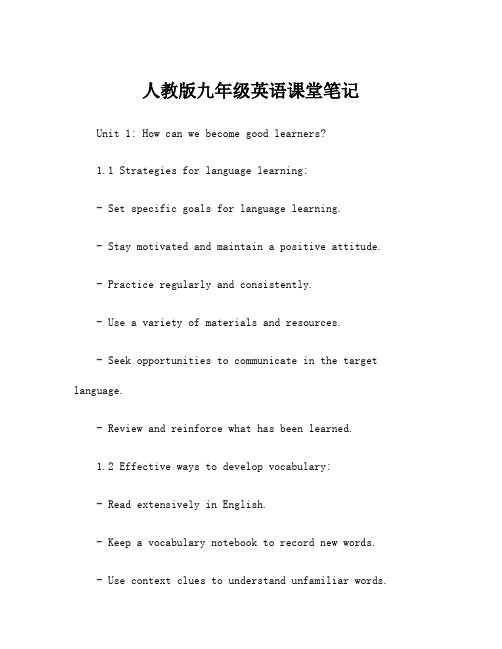
人教版九年级英语课堂笔记Unit 1: How can we become good learners?1.1 Strategies for language learning:- Set specific goals for language learning.- Stay motivated and maintain a positive attitude.- Practice regularly and consistently.- Use a variety of materials and resources.- Seek opportunities to communicate in the target language.- Review and reinforce what has been learned.1.2 Effective ways to develop vocabulary:- Read extensively in English.- Keep a vocabulary notebook to record new words.- Use context clues to understand unfamiliar words.- Use flashcards or online tools for vocabulary practice.- Review and revise vocabulary regularly.- Apply learned words in speaking and writing.1.3 Skills for reading comprehension:- Skim the text to get a general idea.- Scan for specific information.- Pay attention to headings, subheadings, and formatting.- Look for context clues to understand unfamiliar words.- Make predictions and infer meaning from context.- Summarize the main points of the text.1.4 Strategies for listening comprehension:- Pay attention to the speaker's body language and facial expressions.- Focus on keywords and phrases.- Take notes while listening.- Ask questions for clarification.- Practice listening to a variety of accents and speech speeds.- Listen to authentic materials, such as podcasts or videos.1.5 Techniques for effective note-taking:- Use abbreviations and symbols to save time.- Write down key information and main ideas.- Organize information using headings and subheadings.- Use diagrams or mind maps to visualize information.- Review and revise notes after the lecture or class.- Highlight important points or concepts.1.6 Strategies for overcoming difficulties:- Seek help from teachers or classmates when facing challenges.- Break tasks into smaller, manageable parts.- Develop a growth mindset and believe in one's potential.- Practice self-reflection and learn from mistakes.- Find strategies or techniques that work best for individual learning styles.- Stay persistent and persevere through difficult times.Unit 2: Why don't you get her a ticket to the concert?2.1 Making suggestions and offers:- Why don't you...?- How about...?- I suggest...- Would you like me to...?- Do you want...?- Let's...2.2 Expressing preferences:- I prefer...- I'd rather...- I'm more interested in...- I'm not really into...- I'd love to...- I'm not keen on...2.3 Giving and asking for advice: - You should...- It would be a good idea to... - Have you thought about...?- What do you recommend?- What's your opinion on...?- Can you give me any advice on...?2.4 Responding to advice and suggestions:- That's a great idea!- I'll definitely consider it.- I'm not sure about that.- I don't think it's a good option.- Thanks for the suggestion, but I think I'll pass. - I'll think it over and let you know.2.5 Talking about possible outcomes:- If you go to the concert, you'll have a great time. - If you study hard, you'll get good grades.- If it rains, we'll have to stay indoors.- If she misses the bus, she'll be late for school. - If we leave now, we'll catch the train.- If you don't hurry, you'll miss the deadline.2.6 Offering alternatives:- Instead of going to the movie, we could go bowling.- If you don't like pizza, we can order Chinese food.- Rather than taking the bus, you could ride your bike.- If she can't attend the party, we'll invite someone else.- In case of bad weather, we can have the picnic indoors.- If the store is closed, we'll try another one.。
九年级英语笔记
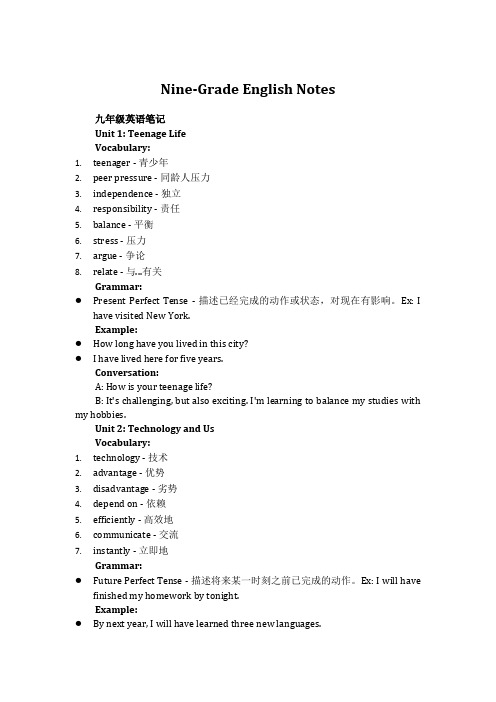
Nine-Grade English Notes九年级英语笔记Unit 1: Teenage LifeVocabulary:1.teenager - 青少年2.peer pressure - 同龄人压力3.independence - 独立4.responsibility - 责任5.balance - 平衡6.stress - 压力7.argue - 争论8.relate - 与...有关Grammar:●Present Perfect Tense - 描述已经完成的动作或状态,对现在有影响。
Ex: Ihave visited New York.Example:●How long have you lived in this city?●I have lived here for five years.Conversation:A: How is your teenage life?B: It's challenging, but also exciting. I'm learning to balance my studies with my hobbies.Unit 2: Technology and UsVocabulary:1.technology - 技术2.advantage - 优势3.disadvantage - 劣势4.depend on - 依赖5.efficiently - 高效地municate - 交流7.instantly - 立即地Grammar:●Future Perfect Tense - 描述将来某一时刻之前已完成的动作。
Ex: I will havefinished my homework by tonight.Example:●By next year, I will have learned three new languages.Conversation:A: How do you think technology has changed our lives?B: It has made communicating easier, but it also makes us dependent on devices.Unit 3: Environmental ProtectionVocabulary:1.environment - 环境2.pollution - 污染3.conserve - 保护4.recycle - 回收5.sustainable - 可持续的6.ecosystem - 生态系统Grammar:●Conditional Sentences (Type 2) - 描述与现在事实相反的情况。
九年级上册英语人教版笔记

九年级上册英语人教版笔记一、Unit 1 How can we become good learners?1. 重点单词。
- aloud:adv. 大声地;出声地。
例如:Read aloud so that we can all hear you.(大声朗读以便我们都能听到你。
)- pronunciation:n. 发音;读音。
Your pronunciation is very good.(你的发音很好。
)- patient:adj. 有耐心的;n. 病人。
Be patient with children.(对孩子们要有耐心。
)- expression:n. 表达(方式);表示。
Facial expressions can show our feelings.(面部表情能展示我们的感受。
)2. 重点短语。
- by doing sth.:通过做某事。
We can improve our English by reading English books.(我们可以通过读英语书提高英语。
)- make mistakes:犯错。
Everyone makes mistakes when they learn something new.(每个人在学习新东西的时候都会犯错。
)- look up:查阅;抬头看。
Look up the new word in the dictionary.(在词典里查阅这个新单词。
)3. 重点句型。
- How do you study for a test?(你如何为考试而学习?)- I study by working with a group.(我通过小组合作来学习。
)- The more you read, the faster you'll be.(你读得越多,你就会读得越快。
)二、Unit 2 I think that mooncakes are delicious!1. 重点单词。
九年级下册英语笔记人教版
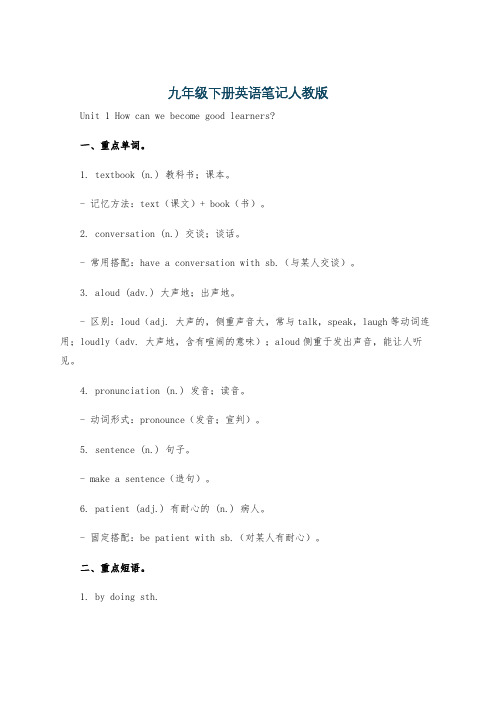
九年级下册英语笔记人教版Unit 1 How can we become good learners?一、重点单词。
1. textbook (n.) 教科书;课本。
- 记忆方法:text(课文)+ book(书)。
2. conversation (n.) 交谈;谈话。
- 常用搭配:have a conversation with sb.(与某人交谈)。
3. aloud (adv.) 大声地;出声地。
- 区别:loud(adj. 大声的,侧重声音大,常与talk,speak,laugh等动词连用;loudly(adv. 大声地,含有喧闹的意味);aloud侧重于发出声音,能让人听见。
4. pronunciation (n.) 发音;读音。
- 动词形式:pronounce(发音;宣判)。
5. sentence (n.) 句子。
- make a sentence(造句)。
6. patient (adj.) 有耐心的 (n.) 病人。
- 固定搭配:be patient with sb.(对某人有耐心)。
二、重点短语。
1. by doing sth.- 意思:通过做某事。
例如:You can improve your English by reading English books.(你可以通过读英语书提高英语水平。
)2. make mistakes.- 意思:犯错。
例如:Everyone makes mistakes when they learn something new.(每个人在学习新东西的时候都会犯错。
)3. look up.- 意思:(在词典、参考书中或通过电脑)查阅;抬头看。
例如:Look up the word in the dictionary if you don't know it.(如果你不认识这个单词就查字典。
)三、重点句型。
1. What about reading aloud to practice pronunciation?- 分析:What about...? 用于提出建议或征求意见,其后接名词、代词或动名词形式。
九年级英语课堂笔记整理
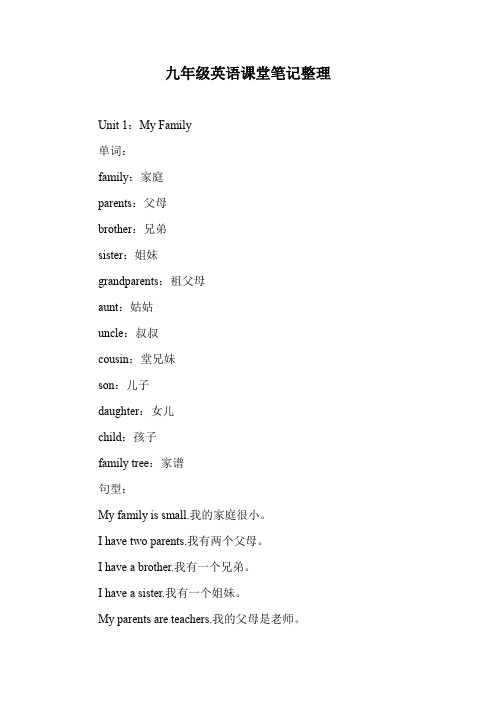
九年级英语课堂笔记整理Unit 1:My Family单词:family:家庭parents:父母brother:兄弟sister:姐妹grandparents:祖父母aunt:姑姑uncle:叔叔cousin:堂兄妹son:儿子daughter:女儿child:孩子family tree:家谱句型:My family is small.我的家庭很小。
I have two parents.我有两个父母。
I have a brother.我有一个兄弟。
I have a sister.我有一个姐妹。
My parents are teachers.我的父母是老师。
My brother is a student.我的兄弟是学生。
My sister is a doctor.我的姐妹是医生。
My grandparents are retired.我的祖父母退休了。
My aunt is a nurse.我的姑姑是护士。
My uncle is a businessman.我的叔叔是商人。
My cousin is a student.我的堂兄妹是学生。
My son is a student.我的儿子是学生。
My daughter is a teacher.我的女儿是老师。
语法:名词单数与复数的变化:一般情况:以s结尾:dog-dogs以o结尾,但读作[ɔ]:hero-heroes以ch、sh、x结尾:church-churches以f结尾:wife-wives以y结尾,但读作[i]:boy-boys以o结尾,但读作[u]:photo-photos名词的所有格:一般情况:单数名词:+'s复数名词:+s'特殊情况:以s结尾的单数名词:+'s以o结尾的单数名词,但读作[u]:+'s 以f结尾的单数名词:+'s名词的比较级和最高级:一般情况:单音节:+er/est双音节或多音节:more/most特殊情况:good-better-bestbad-worse-worstfar-farther/further-farthest/furthestlittle-less-leastmuch-more-mostmany-more-most动词的第三人称单数:一般情况:+s/es特殊情况:以s结尾:+es以o结尾,但读作[u]:+es以ch、sh、x结尾:+es以f结尾:+ves动词的现在进行时:一般情况:be+动词原形+ing 特殊情况:be going to+动词原形be used to+动词原形Unit 2:My School单词:school:学校classroom:教室teacher:老师student:学生desk:课桌chair:椅子board:黑板chalk:粉笔eraser:橡皮book:书notebook:笔记本pen:笔pencil:铅笔ruler:尺子glue:胶水scissors:剪刀backpack:书包lunchbox:午餐盒water bottle:水瓶playground:操场library:图书馆gym:体育馆cafeteria:食堂principal:校长teacher's office:教师办公室restroom:厕所句型:I go to school every day.我每天去上学。
九年级上册英语书笔记

九年级上册英语书笔记一、Unit 1 How can we become good learners?(一)重点单词。
1. textbook:n. 教科书;课本。
- 例如:Our textbooks are very useful for our study.(我们的课本对我们的学习非常有用。
)2. conversation:n. 交谈;谈话。
- 常构成短语“have a conversation with sb.”(与某人交谈),例如:I had a great conversation with my teacher yesterday.(我昨天和我的老师进行了一次很棒的交谈。
)3. aloud:adv. 大声地;出声地。
- 区别于“loud”(adj. 大声的)和“loudly”(adv. 喧闹地)。
“aloud”侧重于发出声音,让别人能听到,常与“read”搭配,如:Read aloud so that everyone can hear you.(大声朗读以便每个人都能听到你。
)4. pronunciation:n. 发音;读音。
- 例如:His pronunciation is very good.(他的发音非常好。
)5. sentence:n. 句子。
- 可以说“make a sentence”(造句),例如:Let's make sentences with these new words.(让我们用这些新单词造句吧。
)(二)重点短语。
1. by working with friends:通过和朋友一起学习。
- 在回答“How do you study for a test?”(你如何为考试而学习?)时可以说:I study by working with friends.(我通过和朋友一起学习。
)2. make word cards:制作单词卡片。
- 这是一种学习单词的有效方法,例如:I make word cards to help me remember new words.(我制作单词卡片来帮助我记住新单词。
九年级英语听课笔记范文10篇
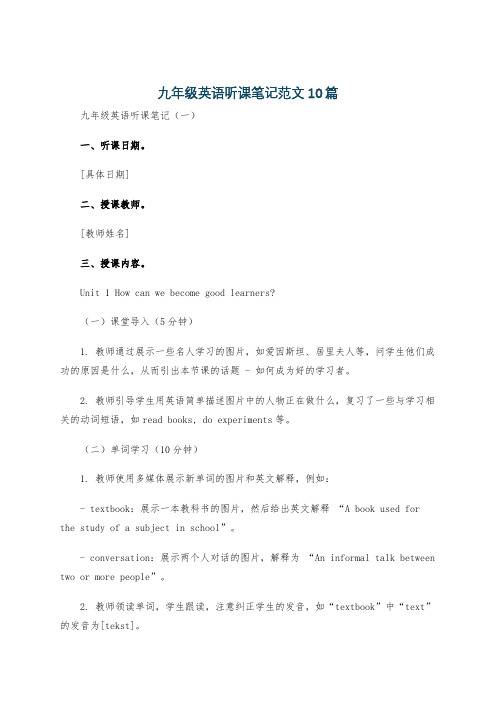
九年级英语听课笔记范文10篇九年级英语听课笔记(一)一、听课日期。
[具体日期]二、授课教师。
[教师姓名]三、授课内容。
Unit 1 How can we become good learners?(一)课堂导入(5分钟)1. 教师通过展示一些名人学习的图片,如爱因斯坦、居里夫人等,问学生他们成功的原因是什么,从而引出本节课的话题 - 如何成为好的学习者。
2. 教师引导学生用英语简单描述图片中的人物正在做什么,复习了一些与学习相关的动词短语,如read books, do experiments等。
(二)单词学习(10分钟)1. 教师使用多媒体展示新单词的图片和英文解释,例如:- textbook:展示一本教科书的图片,然后给出英文解释“A book used for the study of a subject in school”。
- conversation:展示两个人对话的图片,解释为“An informal talk between two or more people”。
2. 教师领读单词,学生跟读,注意纠正学生的发音,如“textbook”中“text”的发音为[tekst]。
3. 让学生以小组为单位互相读单词,互相纠正发音,并进行简单的拼写练习。
(三)课文讲解(20分钟)1. 教师播放课文录音,让学生听并整体感知课文内容,回答问题:“What are the main ways to become good learners mentioned in the passage?”2. 教师逐段讲解课文,分析重点句子。
- 例如:“I study by working with a group.”教师讲解“by + doing sth.”这个结构,表示方式、方法。
- 还有“It's too hard to understand spoken English.”教师强调“too...to...”结构的用法,表示“太……而不能……”。
英语九年级全一册笔记

英语九年级全一册笔记以下是一些九年级英语全一册的笔记,供您参考:1. 词汇和短语:积累并记忆常用的词汇和短语,例如“have a conversation with sb”(与某人谈话)、“it’s too…”(太…)、“take a risk to do sth”(冒险做某事)、“get into the habit of…”(养成…的习惯)、“stay away from…”(远离…)、“be unable todo sth”(不能做某事)、“focus on”(集中于,致力于)、“take out”(取出,拿出)以及“so that”(为了,以便)等。
2. 语法:掌握一般现在时的用法,它通常表示经常或习惯性的动作或者状态。
结构为主语+动词原形/动词现三单形式+宾语,例如“I like apples”(我喜欢苹果)和“He likes apples”(他喜欢苹果)。
此外,也要学习并掌握情态动词的用法,如“can/could”、“may/might”、“should”、“must”和“need”等。
3. 课文学习:在学习课文时,要注意理解和掌握课文中的重点词汇、短语和语法结构。
同时,通过阅读课文,提高自己的阅读能力和阅读技巧。
4. 练习和活动:完成教材中的练习和活动,巩固所学知识。
例如,通过完成句子、填空、翻译等练习,加深对词汇和语法的理解和记忆。
5. 听力与口语:利用教材中的听力材料和口语练习,提高自己的听力和口语表达能力。
在听力的过程中,注意捕捉关键信息,理解对话或短文的大意。
在口语练习中,勇于开口,不怕犯错,多与同学进行交流和讨论。
6. 写作:尝试撰写短文或邮件等文本形式,练习使用所学的词汇和语法结构,提高自己的写作能力。
注意文章的逻辑性和连贯性。
7. 学习策略:合理安排学习时间,保持积极的学习态度。
对于不理解的知识点,及时向老师或同学请教。
同时,通过多种渠道获取英语学习的资源,例如阅读英文原著、听英语歌曲或看英语电影等,提高自己的英语综合能力。
英语九年级上册笔记
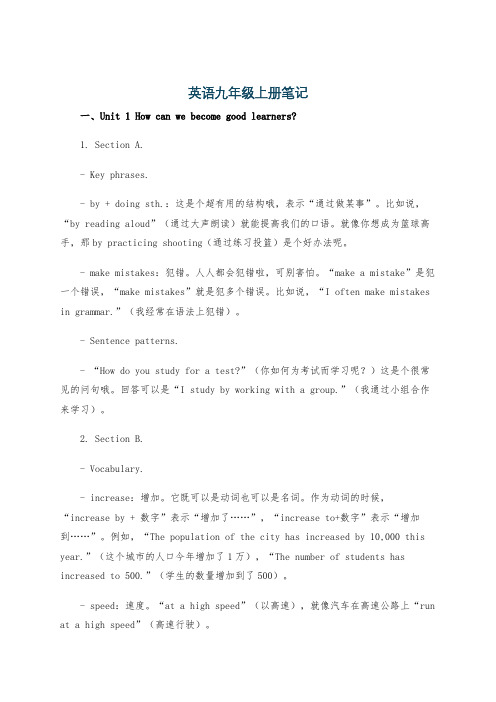
英语九年级上册笔记一、Unit 1 How can we become good learners?1. Section A.- Key phrases.- by + doing sth.:这是个超有用的结构哦,表示“通过做某事”。
比如说,“by reading aloud”(通过大声朗读)就能提高我们的口语。
就像你想成为篮球高手,那by practicing shooting(通过练习投篮)是个好办法呢。
- make mistakes:犯错。
人人都会犯错啦,可别害怕。
“make a mistake”是犯一个错误,“make mistakes”就是犯多个错误。
比如说,“I often make mistakes in grammar.”(我经常在语法上犯错)。
- Sentence patterns.- “How do you study for a test?”(你如何为考试而学习呢?)这是个很常见的问句哦。
回答可以是“I study by working with a group.”(我通过小组合作来学习)。
2. Section B.- Vocabulary.- increase:增加。
它既可以是动词也可以是名词。
作为动词的时候,“increase by + 数字”表示“增加了……”,“increase to+数字”表示“增加到……”。
例如,“The population of the city has increased by 10,000 this year.”(这个城市的人口今年增加了1万),“The number of students has increased to 500.”(学生的数量增加到了500)。
- speed:速度。
“at a high speed”(以高速),就像汽车在高速公路上“run at a high speed”(高速行驶)。
- Text understanding.- 这部分的课文告诉我们要有好的学习习惯,像做笔记啦(take notes),复习啦(review)。
新人教版九年级英语全册知识点总结 (课堂笔记)
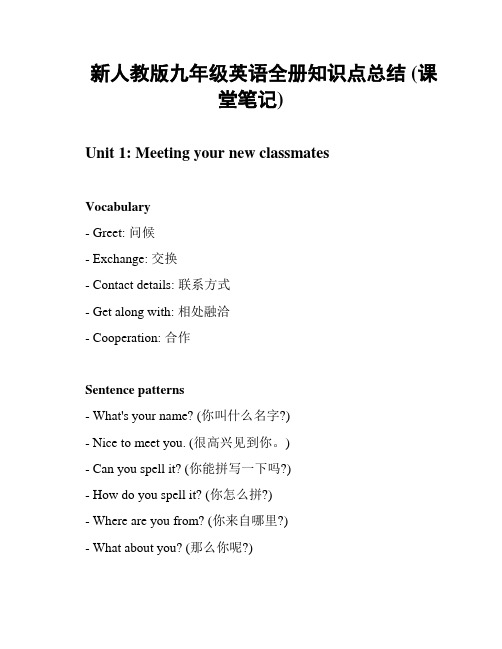
新人教版九年级英语全册知识点总结 (课堂笔记)Unit 1: Meeting your new classmatesVocabulary- Greet: 问候- Exchange: 交换- Contact details: 联系方式- Get along with: 相处融洽- Cooperation: 合作Sentence patterns- What's your name? (你叫什么名字?)- Nice to meet you. (很高兴见到你。
)- Can you spell it? (你能拼写一下吗?)- How do you spell it? (你怎么拼?)- Where are you from? (你来自哪里?)- What about you? (那么你呢?)- What's your phone number/email address? (你的电话号码/邮箱地址是多少?)- Let's exchange contact details. (咱们交换一下联系方式吧。
) - How do you like your new school? (你觉得新学校怎么样?)- I'm getting along well with my classmates. (我和同学相处得不错。
)Unit 2: School lifeVocabulary- Education: 教育- Facilities: 设施- Clubs: 社团- Activities: 活动- Schedule: 课程表Sentence patterns- Our school provides high-quality education. (我们学校提供高质量的教育。
)- We have modern facilities like a library, sports ground, and labs. (我们有现代化的设施,如图书馆、运动场和实验室。
九年级英语上册笔记

九年级英语上册笔记Unit 1 How can we become good learners?Vocabulary:- textbook (n.) A book used for the study of a subject. For example, "We need to bring our English textbooks to class."- conversation (n.) A talk between two or more people. "I had an interesting conversation with my English teacher about learning methods."- aloud (adv.) In a voice that can be heard clearly. "Read the passage aloud, it helps with pronunciation."Grammar:- by + doing. We use this structure to express how something is done. For example, "You can improve your English by reading English books."Unit 2 I think that mooncakes are delicious!Vocabulary:- mooncake (n.) A traditional Chinese food eaten during the Mid - Autumn Festival. "Mooncakes come in different flavors, like lotus seed paste and red bean paste."- lantern (n.) A container made of transparent material that can hold a light. "We hang lanterns during the Lantern Festival."Cultural knowledge:- The Mid - Autumn Festival is a time for family reunions in China. People eat mooncakes and admire the full moon.Unit 3 Could you please tell me where the restrooms are?Vocabulary:- restroom (n.) A room with toilets and washing facilities, especially in a public place. "I need to find a restroom urgently."- bookstore (n.) A place where books are sold. "There is a big bookstore near my school."Polite requests:- We use "Could you please...?" to make polite requests. For example, "Could you please tell me the way to the nearest library?"Unit 4 I used to be afraid of the dark.Vocabulary:- dark (n.) The absence of light. "I was afraid of the dark when I was a child."- insect (n.) A small animal with six legs. "There are many insects in the garden."Used to:- "Used to" is used to talk about past habits or states that are no longer true. For example, "I used to play with dolls, but now I'm more interested in reading."Unit 5 What are the shirts made of?Vocabulary:- material (n.) The substances or matter from which something is made. "Cotton is a common material for making clothes."- product (n.) Something that is made or grown to be sold. "Thisfactory produces a lot of high - quality products."Made of / made from:- "Made of" is used when the original material can be easily seen. For example, "The table is made of wood." "Made from" is used when the original material has changed a lot. For example, "Paper is made from wood."。
九英Unit1课堂笔记
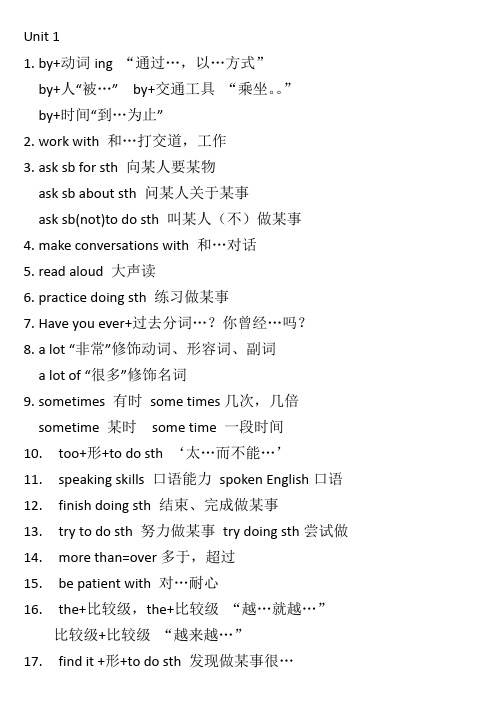
Unit 11.by+动词ing “通过…,以…方式”by+人“被…” by+交通工具“乘坐。
”by+时间“到…为止”2.work with 和…打交道,工作3.ask sb for sth 向某人要某物ask sb about sth 问某人关于某事ask sb(not)to do sth 叫某人(不)做某事4.make conversations with 和…对话5.read aloud 大声读6.practice doing sth 练习做某事7.Have you ever+过去分词…?你曾经…吗?8.a lot “非常”修饰动词、形容词、副词a lot of “很多”修饰名词9.sometimes 有时some times几次,几倍sometime 某时some time 一段时间10.too+形+to do sth ‘太…而不能…’11.speaking skills 口语能力spoken English口语12.finish doing sth 结束、完成做某事13.try to do sth 努力做某事try doing sth尝试做14.more than=over多于,超过15.be patient with 对…耐心16.the+比较级,the+比较级“越…就越…”比较级+比较级“越来越…”17.find it +形+to do sth 发现做某事很…find sb doing sth 发现某人正在做某事18.the secret /answer/key to.. “…的秘密/答案/钥匙”19.so+形/副+that从句“如此…以至…”20.be afraid to do sth 害怕做某事be afraid of sth害怕某物21.because of+名词/动名词22.fall(fell) in love with 爱上…23.as well “也”24.动词做主语时要用动名词形式,且动词用第三人称单数25.Look them/it up in a dictionary 查字典26.enjoy doing sth 喜欢做某事27.make mistakes in 在…犯错28.the ability to .. ..的能力depend on取决于29.whether or not 是否30.in common 共同,普遍31.create an int erest in…=be interested in +doing对…感兴趣32.pay attention to +doing sth 注意,关注33.connect ..with.. ‘把…和…联系’34.even if=even though 即使,尽管35.keep doing sth 继续/保持做某事36.learn from 向…学习37.remember to do sth 记得做某事(没做)remember doing sth 记得做过某事(已做)38.be stressed out 紧张bit by bit 一点点instead of 代替over and over again 反复。
九年级上册英语书仁爱版笔记

九年级上册英语书仁爱版笔记仁爱版九年级上册英语书笔记。
一、Unit 1 The Developing World。
(一)重点单词。
1. proper.- adj. 恰当的,合适的;正确的。
例如:You should use proper language in public.(在公共场合你应该使用恰当的语言。
)2. by the way.- 顺便说一下。
常用来引出一个新的话题。
例如:By the way, have you seen Tom lately?(顺便问一下,你最近见过汤姆吗?)3. volunteer.- n. 志愿者;v. 自愿做。
例如:Many volunteers helped the old people in the nursing home.(许多志愿者帮助养老院里的老人。
)She volunteered to clean the classroom.(她自愿打扫教室。
)(二)重点短语。
1. have a good time.- 玩得高兴,过得愉快。
相当于enjoy oneself或have fun。
例如:We had a good time at the party last night.(昨晚我们在聚会上玩得很开心。
)2. give a report.- 作报告。
例如:The scientist will give a report on environmental protection tomorrow.(这位科学家明天将作一个关于环境保护的报告。
)(三)重点句型。
1. You have just come back from your hometown.(你刚从你的家乡回来。
)- 这是一个现在完成时的句子,表示过去发生的动作对现在造成的影响。
其结构为“have/has+过去分词”,come的过去分词是come。
2. Great changes have taken place there.(那里发生了巨大的变化。
九年级英语听课笔记范文10篇
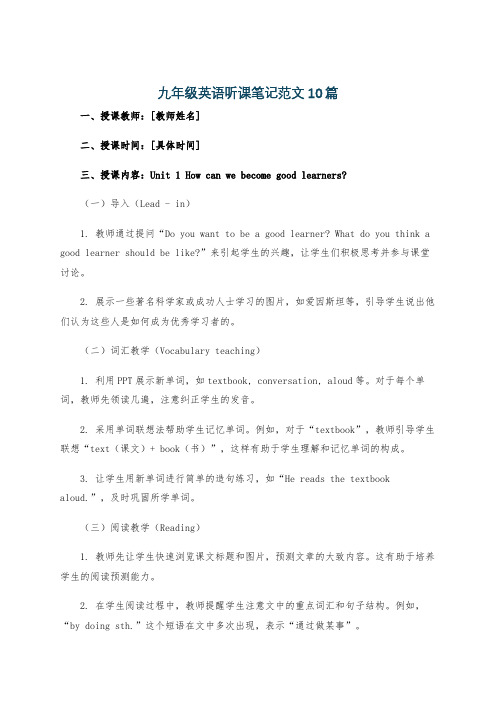
九年级英语听课笔记范文10篇一、授课教师:[教师姓名]二、授课时间:[具体时间]三、授课内容:Unit 1 How can we become good learners?(一)导入(Lead - in)1. 教师通过提问“Do you want to be a good learner? What do you think a good learner should be like?”来引起学生的兴趣,让学生们积极思考并参与课堂讨论。
2. 展示一些著名科学家或成功人士学习的图片,如爱因斯坦等,引导学生说出他们认为这些人是如何成为优秀学习者的。
(二)词汇教学(Vocabulary teaching)1. 利用PPT展示新单词,如textbook, conversation, aloud等。
对于每个单词,教师先领读几遍,注意纠正学生的发音。
2. 采用单词联想法帮助学生记忆单词。
例如,对于“textbook”,教师引导学生联想“text(课文)+ book(书)”,这样有助于学生理解和记忆单词的构成。
3. 让学生用新单词进行简单的造句练习,如“He reads the textbook aloud.”,及时巩固所学单词。
(三)阅读教学(Reading)1. 教师先让学生快速浏览课文标题和图片,预测文章的大致内容。
这有助于培养学生的阅读预测能力。
2. 在学生阅读过程中,教师提醒学生注意文中的重点词汇和句子结构。
例如,“by doing sth.”这个短语在文中多次出现,表示“通过做某事”。
3. 阅读后,教师提出一些理解性问题,如“How can the writer become a good English learner?”“What methods does the writer mention?”让学生们分组讨论并回答。
在这个过程中,学生们不仅提高了阅读理解能力,还锻炼了团队协作能力。
(四)语法教学(Grammar)1. 本节课的语法重点是“by + 动名词”结构。
初中英语课堂笔记初三九年级全一册 Unit1Unit2
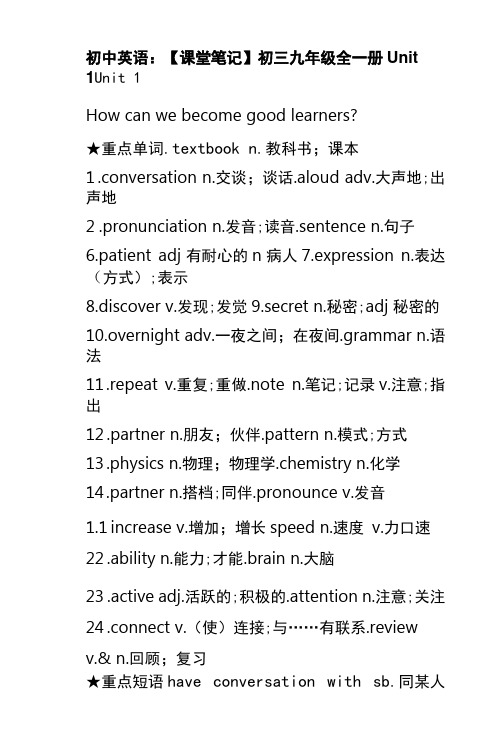
初中英语:【课堂笔记】初三九年级全一册Unit1Unit 1How can we become good learners?★重点单词.textbook n.教科书;课本1.conversation n.交谈;谈话.aloud adv.大声地;出声地2.pronunciation n.发音;读音.sentence n.句子6.patient adj有耐心的n病人7.expression n.表达(方式);表示8.discover v.发现;发觉9.secret n.秘密;adj秘密的10.overnight adv.一夜之间;在夜间.grammar n.语法11.repeat v.重复;重做.note n.笔记;记录v.注意;指出12.partner n.朋友;伙伴.pattern n.模式;方式13.physics n.物理;物理学.chemistry n.化学14.partner n.搭档;同伴.pronounce v.发音1.1increase v.增加;增长speed n.速度v.力口速22.ability n.能力;才能.brain n.大脑23.active adj.活跃的;积极的.attention n.注意;关注24.connect v.(使)连接;与……有联系.review v.& n.回顾;复习★重点短语have conversation with sb.同某人谈话1.too...to...太……而不能the secret to的秘诀2.be afraid of doing sth./ be afraid to do sth.害怕做某事look up 查阅3.repeat out loud 大声是艮读make mistakes in在方面犯错误4.connect……with...把……和……连接/联系起来5.get bored 感到厌烦be stressed out 焦虑不安的6.pay attention to 注意;关注depend on取决于"衣靠7.the ability to do sth..做某事的能力★重点句型1.提建议的句子:①What/how about +doing sth?做怎么样?如:What/How about going shopping?②Why don't you + do sth?你为什么不做?如:Why don't you go shopping?③Why not+do sth?为什么不做?如:Why not go shopping?④Let's + do sth.让我们做……吧。
九年级英语笔记或知识点
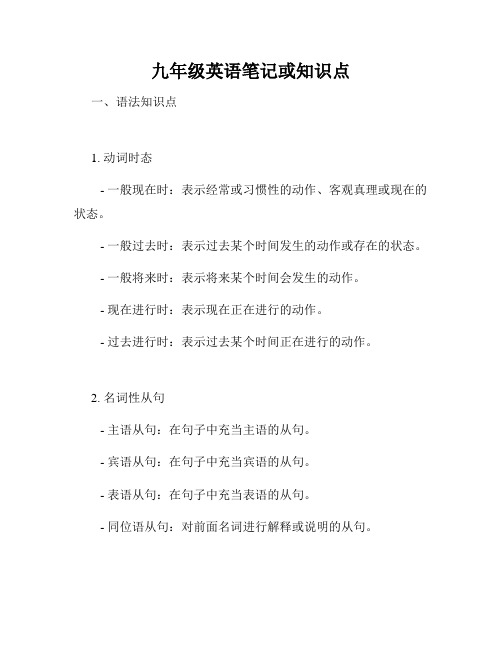
九年级英语笔记或知识点一、语法知识点1. 动词时态- 一般现在时:表示经常或习惯性的动作、客观真理或现在的状态。
- 一般过去时:表示过去某个时间发生的动作或存在的状态。
- 一般将来时:表示将来某个时间会发生的动作。
- 现在进行时:表示现在正在进行的动作。
- 过去进行时:表示过去某个时间正在进行的动作。
2. 名词性从句- 主语从句:在句子中充当主语的从句。
- 宾语从句:在句子中充当宾语的从句。
- 表语从句:在句子中充当表语的从句。
- 同位语从句:对前面名词进行解释或说明的从句。
3. 语态- 主动语态:表示主语是动作的执行者。
- 被动语态:表示主语是动作的承受者。
二、词汇梳理1. 动词短语- look forward to:期待- give up:放弃- take part in:参加- get along with:与...相处- keep up with:跟上2. 形容词和副词- confident:自信的- talented:有才能的- hardworking:勤奋的- actively:积极地- easily:容易地3. 介词短语- on behalf of:代表- in front of:在...前面- at the beginning of:在...开始时 - by means of:通过...方式三、阅读技巧1. 快速阅读- 浏览文本,获取整体内容。
- 注意常见关键词。
- 不要在每个单词上停留太久。
2. 猜词义- 通过上下文推测词义。
- 注意常见的词缀、词根。
- 使用词典查找生词。
3. 理解段落结构- 注意段落的主题句。
- 理解段落内部的逻辑关系。
- 使用关键词帮助理解段落。
四、写作技巧1. 时态运用- 根据实际情况选择适当的时态。
- 注意时态之间的逻辑关系。
- 注意特殊句型的时态要求。
2. 句子连接词- 使用连接词使句子之间更加连贯。
- 常用的连接词有and、but、however、therefore等。
九年级英语听课笔记范文10篇
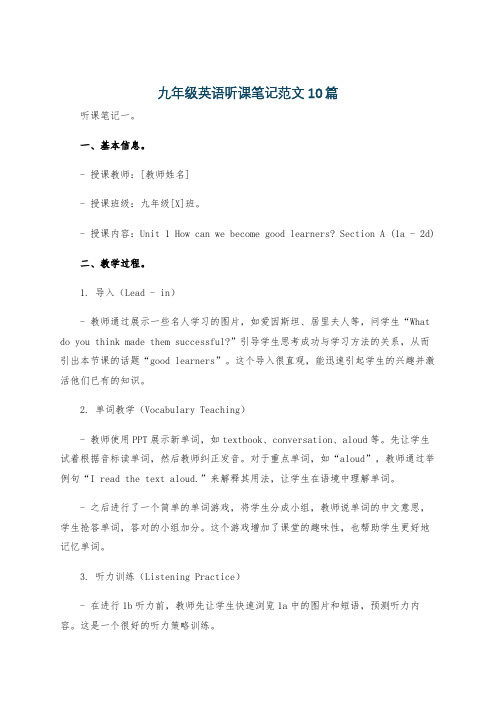
九年级英语听课笔记范文10篇听课笔记一。
一、基本信息。
- 授课教师:[教师姓名]- 授课班级:九年级[X]班。
- 授课内容:Unit 1 How can we become good learners? Section A (1a - 2d)二、教学过程。
1. 导入(Lead - in)- 教师通过展示一些名人学习的图片,如爱因斯坦、居里夫人等,问学生“What do you think made them successful?”引导学生思考成功与学习方法的关系,从而引出本节课的话题“good learners”。
这个导入很直观,能迅速引起学生的兴趣并激活他们已有的知识。
2. 单词教学(Vocabulary Teaching)- 教师使用PPT展示新单词,如textbook、conversation、aloud等。
先让学生试着根据音标读单词,然后教师纠正发音。
对于重点单词,如“aloud”,教师通过举例句“I read the text aloud.”来解释其用法,让学生在语境中理解单词。
- 之后进行了一个简单的单词游戏,将学生分成小组,教师说单词的中文意思,学生抢答单词,答对的小组加分。
这个游戏增加了课堂的趣味性,也帮助学生更好地记忆单词。
3. 听力训练(Listening Practice)- 在进行1b听力前,教师先让学生快速浏览1a中的图片和短语,预测听力内容。
这是一个很好的听力策略训练。
- 在听的过程中,教师提醒学生注意关键词,如“by working with groups”等。
听完后,教师让学生核对答案,并让个别学生重复听到的句子,以检查他们的听力理解情况。
4. 对话教学(Dialogue Teaching)- 教师播放2d的对话录音,让学生整体感知对话内容。
然后教师逐句讲解对话中的重点词汇和句型,如“have conversations with”“the secret to...”等。
九年级英语课堂笔记
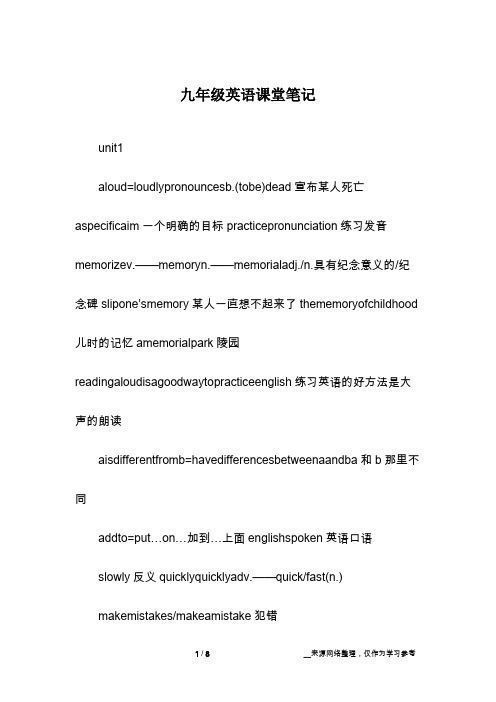
九年级英语课堂笔记unit1aloud=loudlypronouncesb.(tobe)dead宣布某人死亡aspecificaim一个明确的目标practicepronunciation练习发音memorizev.——memoryn.——memorialadj./n.具有纪念意义的/纪念碑slipone’smemory某人一直想不起来了thememoryofchildhood 儿时的记忆amemorialpark陵园readingaloudisagoodwaytopracticeenglish练习英语的好方法是大声的朗读aisdifferentfromb=havedifferencesbetweenaandba和b那里不同addto=put…on…加到…上面englishspoken英语口语slowly反义quicklyquicklyadv.——quick/fast(n.)makemistakes/makeamistake犯错receive/aeptchallenge接受挑战challengesb.todosth.向某人挑战某事oftenmakeupconvertinginclasstolearnenglish同学们经常在课堂上制造对话hewillreturnthebookinthreedaysoffourin+一段时间itdoesn’tmatter没关系beafraidtodo=beafraidofdoing害怕做某事keepsecret保守秘密thefirstimpressed第一印象bedeeplyimpressedby/with/atsth.对某事印象深刻impresssb.withsth.某事让某人印象深刻makealastingimpressiononsb.给某人留下不可保留的印象lookfortrouble自讨苦吃getintotrouble陷入困境havetroubleindoing干某事有麻烦taketroubletodo不辞辛劳的干某事troublesb.todo麻烦某人干某事howaboutdoingsth.=whataboutdoingsth.whydon’tyoudo=whynotdomakeupconversation编造对话makeup编造/由…组成/装扮hoemany+可数名词复数不可数名词:luggage行李/furniture家具/advice建议/weather天气/news新闻/information消息/progress进步/fun乐趣makeprogress取得进步alotofadvice大量的建议apieceofadvice一条建议lookupawordinadictionary=consultadictionary=refertoadictionary查字典makeafter追赶makeitup和好makeout辨认makefor朝哪个方向走make…from用。
- 1、下载文档前请自行甄别文档内容的完整性,平台不提供额外的编辑、内容补充、找答案等附加服务。
- 2、"仅部分预览"的文档,不可在线预览部分如存在完整性等问题,可反馈申请退款(可完整预览的文档不适用该条件!)。
- 3、如文档侵犯您的权益,请联系客服反馈,我们会尽快为您处理(人工客服工作时间:9:00-18:30)。
九年级上册英语笔记
Unit1
Aloud=loudly pronounce sb. (to be) dead宣布某人死亡 a specific aim一个明确的目标practice pronunciation练习发音memorize v.——memory n.——memorial adj. /n. 具有纪念意义的/纪念碑slip one’s memory某人一直想不起来了the memory of childhood 儿时的记忆a memorial park 陵园Reading aloud is a good way to practice English 练习英语的好方法是大声的朗读
A is different from B=have differences between A and
B A和B那里不同
Add to=put…on …加到…上面English spoken 英语口语
Slowly反义quickly quickly adv .——quick/fast(n.)
Make mistakes/make a mistake 犯错
Receive/accept challenge 接受挑战challenge sb. To do sth. 向某人挑战某事Often make up converting in class to learn English 同学们经常在课堂上制造对话He will return the book in three days of four in+一段时间
it doesn’t matter 没关系be afraid to do=be afraid of doing 害怕做某事
keep secret 保守秘密the first impressed 第一印象
be deeply impressed by/with/at sth. 对某事印象深刻impress sb. With sth. 某事让某人印象深刻make a lasting impression on sb. 给某人留下不可保留的印象
look for trouble 自讨苦吃get into trouble 陷入困境have trouble in doing 干某事有麻烦take trouble to do 不辞辛劳的干某事trouble sb. to do麻烦某人干某事How about doing sth.=What about doing sth.
Why don’t you do=Why not do
Make up conversation 编造对话make up 编造/由…组成/装扮hoe many+可数名词复数不可数名词:luggage行李/furniture家具/advice建议/weather天气/news 新闻/information消息/progress进步/fun乐趣
Make progress 取得进步a lot of advice 大量的建议a piece of advice 一条建议Look up a word in a dictionary=consult a dictionary=refer to a dictionary 查字典Make after 追赶make it up 和好make out 辨认make for 朝哪个方向走Make…from 用。
制成make the best of 充分利用
Deal with 与某人做买卖deal sth. to be 把某件东西分给某人make/do a deal with sb. 与某人做买卖It’s a deal 一言为定great deal of 很多unless=if…not 除非Regard sth. as 将…视为… give regards to sb. 想某人问好
In/with regard to=as for 至于/关于as for me=as for as I’m concerned 对于我而言Ashes of duty责任感the duty of sb.某人的责任on duty在值班off duty不在值班Exercise influence on 对…施加影响去in disagree with sb. 与某人意见不合Developed country 发达国家developing country 发展中国家
Break an appointment失约/the law 犯法/prison越狱
Break up 分解break away from 脱离… break out 战争爆发
With the development of economy 随着经济的发展
Try one’s best to do=do one’s best to do尽力做某事be faced with …面对…
To one’s face 当着某人的面face to face 面对面
Get lots of practice 得到大量练习get excited about sth 因…变得激动
End up doing/end up as 以…结束/最终成为什么
Have conversations with sb. 与某人对话
Turn off 关上turn on 打开turn up 上调turn down 下调turn over 翻转
He make mistakes in pronunciation 他在发音方面犯错误
Feels 感觉起来taste 尝起来sound 听起来look 看起来
Change sth into sth 把…变为… with the help of sb. 在…的帮助下
It’s sb’s duty to do sth 是某人的责任be strict with sb. 对某人严格be strict in sth 对某事严格compare…to…把…事与…做比较
Be/got used to doing 习惯于干某事
主+have/has+动词一般过去式It+be动词+过去分词+从句
It’s said that reported 据报道It’s be lived that 众所周知It’s proved that 据证明
加ing的词:enjoy/finish/practice/mind/be busy doing/have fun doing/prefer doing sth to ding be/get used to doing/look forward to doing/be in retested in doing
加to do的词:want/agree/refuse/decide/plan/expect/hope/wish
及物动词与不及物动词
及物动词符号vt
常见的有:enjoy like love play watch read 这一类词后可以直接加宾语
For example:open the window; read the book; enjoy playing basketball
不及物动词符号vi 无被动形势
常见的有:arrive look come put take listen 不能直接加宾语,需先在某后加一个介词再接宾语
For example:He is listening to the teacher carefully
Keep:保持/履行/赡养/庆祝
使…处于某种状态(情况)
1.保持健康keep healthy/stay healthy/keep fit/keep in good health/be pretty healthy
2.keep one’s promise everybody must keep the law
3.He has a large family to keep
4.keep the spring festal
5.He kept me waiting for half an hour
句型:1.What’s your favorites=What…do you like best
2. What can you do to improve your English
例题:1.Chen Hui used to play computer game, outside on weekends; but now he is used to doing his homework at home.
2. My life has changed a lot dunning the last few yeas
3. It’s difficult for the boy to carry the heavy box.
4. This question is so hard that I can’t understand it. (改为同义句)
This question is to hard for me too understand
6.Why don’t you learn to play football? (改为同义句)
Why not learn to play football?
Unit2
be terrified by/at 被…吓一跳be terrified of 对…恐慌terrified sb. into doing sth 恐吓某人have a chat with sb. 和某人聊天
be patient with sb. 对某人有耐心
be patient of sth. 对某事有耐心。
